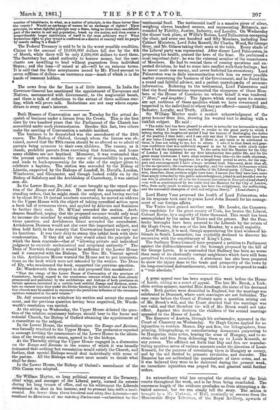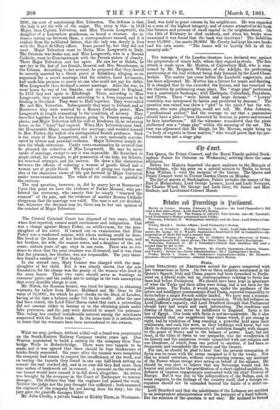An extraordinary trial has occupied the attention of the Irish
courts throughout the week, and is far from being concluded. The enormous length of -the evidence prealn.des us from attempting a de- tailed account, but -we 'can simply tell the story. "The action is brought by a Mr. Thelwall, of 114 nominally to .recover from the Honourable Major Yeivertou, of the Royal Artillery, upwards of
2501., the cost of maintaining Mrs. Yelverton. The defence is that, the lady is not the wife of the major. The story is this: in 1853 Major, then Captain Yelverton, met Miss Theresa Longworth, the daughter of a Lancashire gentleman, on board a steamer. An in- timacy sprang up between them, a correspondence ensued, and it is evident from the published letters, that the lady was deeply in love with the Royal Artillery officer. Years passed by, but they did not meet. Major Yelverton went to Malta, Miss Longworth to Italy. The Crimean war broke out, and Miss Longworth, who is a Roman Catholic, went to Constantinople with the French sisters of charity. There Major Yelverton met her again. He saw her at Galata, he saw her in the hut of her friends, General and Mrs. Straubenzee, in the Crimea. According to her account, he proposed that they should be secretly married by a Greek priest at Balaklava, alleging, as an
liargument for a secret marriage, that his relative, Lord Avonmore, irSalde him promise to marry no one who could not pay his debts. Miss Longworth then declined a secret marriage. After the war, he went home by way of the Danube, and she returned to England. In 1857 they met again in Edinburgh. There, according to Miss Longworth, they were married according to a form supposed to be binding in Scotland. They went to Hull together. They were called Mr. and Mrs. Yelverton. Subsequently they went to Ireland, and at Rostrevor they were married by a Roman Catholic priest; Miss Longworth at length consenting to the condition of secrecy. They travelled together for the honeymoon, going to France among other places, and Major Yelverton left his wife at Bordeaux ill, he returning home, as his "leave" had expired. When Mrs. Yelverton came back, the Honourable Major repudiated the marriage, and wedded himself to Mrs. Forbes, the widow of a distinguished Scotch professor. Such is the story of Miss Longworth, and it is very materially corrobo- rated by letters and personal evidence. Major Yelverton simply de- nies the whole statement. Under cross-examination he avowed that be planned the seduction of Miss Longworth. He says he never spoke of marriage, except to say it was impossible. He deseribed, in ample detail, his attempts to get possession of the lady, his failures, his renewed attempts, and his success. He drew a fine distinction between the offence of seducin,,,, a woman of gentle blood and a woman not of gentle blood. We despair of giving our readers any idea of the shameless views of life put forward by Major Yelverton under cross-examination. The whole of his evidence is painful in the extreme.
The real question, however, is, did he marry her at Rostrevor ? Upon this point we have the evidence of Father Mooney, who per- formed the ceremony, who asserts that he simply "renewed the consent" of the pair, and the evidence of another Roman Catholic clergyman that the marriage was valid. The case is not yet decided; but, whatever the decision may be, there can be but one opinion of - the conduct of Major Yelverton.































 Previous page
Previous page